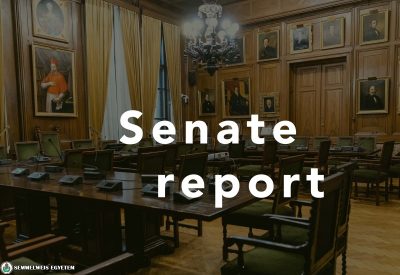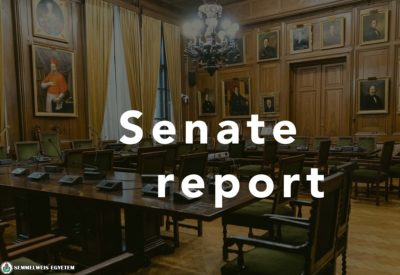The formal framework of the new Organizational and Operational Regulations (SZMSZ) now under preparation, the process of proposing nominees for state and ministerial awards, as well as opinions on current applications for executive and teaching positions were among the issues the university’s Senate decided on at its April meeting.
The Senate approved the proposal submitted by rector Dr. Béla Merkely on the structure of the new Organizational and Operational Regulations, which as the first step of the overhauled SZMSZ provides the formal framework for the new regulations. According to this, after the preamble defining the general principles, the regulations will be divided into three sections: the Organizational and Operational Order (SZMR), the Common Requirements for Employees (FKR), and the Common Requirements for Students (HKR). Following the current decision on the technical and structural framework, the formulation and approval of the new SZMSZ will be carried out in several steps, by the deadlines of July 1 and September 30. As the proposal pointed out, the rector has established a so-called Organizational Development Advisory Body to work out the new SZMSZ, which conducted a thematic overview of the regulations and will prepare changes in content as well.
Within the section of the SZMSZ on the requirements for students, the regulations on the acceptance process were modified, as the regulations on the acceptance process for the two new postgraduate specialist training courses of the Faculty of Health and Public Administration (EKK), namely community and family mediation, and school social work, were included.
The proposal on launching vocational school training within the framework of the András Pető Faculty’s Center for Conductive Education, as well as other related measures, were approved at the meeting.
Senators voted to approve the new curriculum of the specialist training course in lactation consulting at the EKK’s Institute of Mental Health, which includes the changes to the training and graduation requirements by adding basic courses in medical and health sciences.
The Regulations on Awards, which deals with honors and awards handed out by the university, as well as the process of nominating candidates for state awards, was also modified. According to the approved proposal, the nominations will be presented by the rector to the Senate, following a request for an opinion provided by a committee asked by the rector, while the rector will also be able to propose other nominations. Previously, the nomination proposals coordinated and supported on the faculty level were, following a technical check and aggregation, presented by the Directorate General of Human Resources (EGFI) directly to the Senate.
The Senate also voted on the opinions for several ongoing applications for executive and teaching positions.
In order to assess the needs of international students, a committee will be formed, to be led by the rector and in cooperation with the chancellor.
Pálma Dobozi
Translation: Tamás Deme


